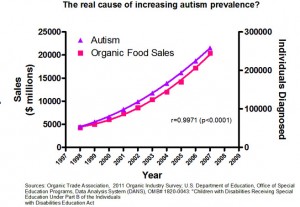One of the common arguments that anti-vaxxers use to support their cause is that as vaccination rates have increased so have autism diagnoses. People will even trot out pretty graphs showing a steep increase in autism rates following the introduction of the MMR vaccine. There is no medical evidence that vaccinations lead to autism as I discussed in a previous post. Making the leap from correlation to causation is fairly common, even among science majors, though. One of the first activities I do in my Neurophysiology class is a Correlation vs. Causation assignment (full activity: NeuroscienceSociety1_CorrelationVSCausation_2). I have students describe what conclusions they can draw from the graph below. I then have them design an experiment that would actually test whether organic food sales/consumption causes autism.
Fun Activity to Teach Correlation vs. Causation
http://imgur.com/1WZ6h
This activity is a good way to review things like independent and dependent variables, controlled experimental design, and to challenge them to come up with reasons why two things may be correlated. I also challenged the students to find news articles that improperly conflated correlation with causation and they came up with some doozies. For instance, people who have more sex make more money and kids who eat lots of candy are more likely to be jailed for violent offenses. No discussion of bad science would be complete without a mention of everyone’s favorite ‘Dr.’, Dr. Oz. He had a woman on his show claiming that carrying your cell phone in your bra could lead to breast cancer since she had developed a tumor at the exact location where she carried her cell phone. Some other fun correlations (that were reported as such) included decreased highway fatalities with increasing Mexican lemon imports and increased margarine in the house with increased divorce rates. My absolute favorite correlation (reported in a New England Journal of Medicine study with a proposed, although not directly tested mechanism) was that increasing chocolate consumption correlates with the number of Nobel Prize winners per capita. So, skip those late nights in the lab and eat more chocolate (or not if you learned something about correlation)!
